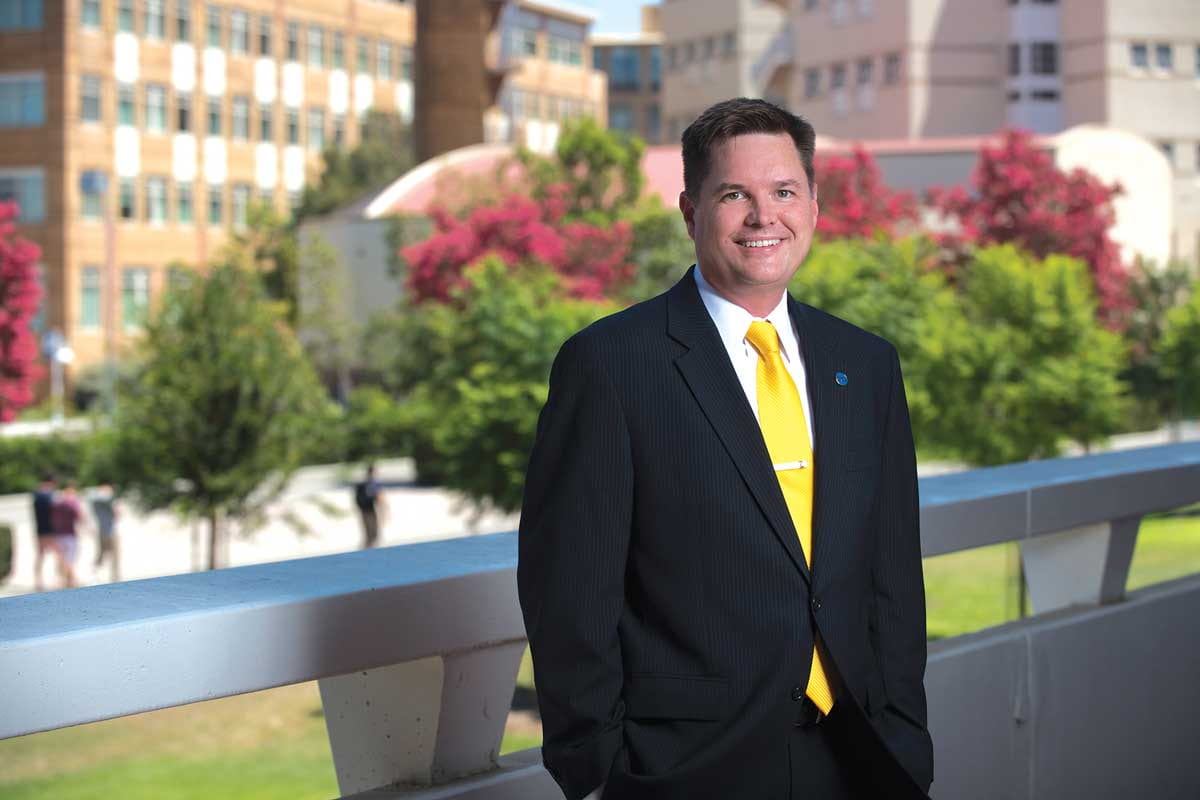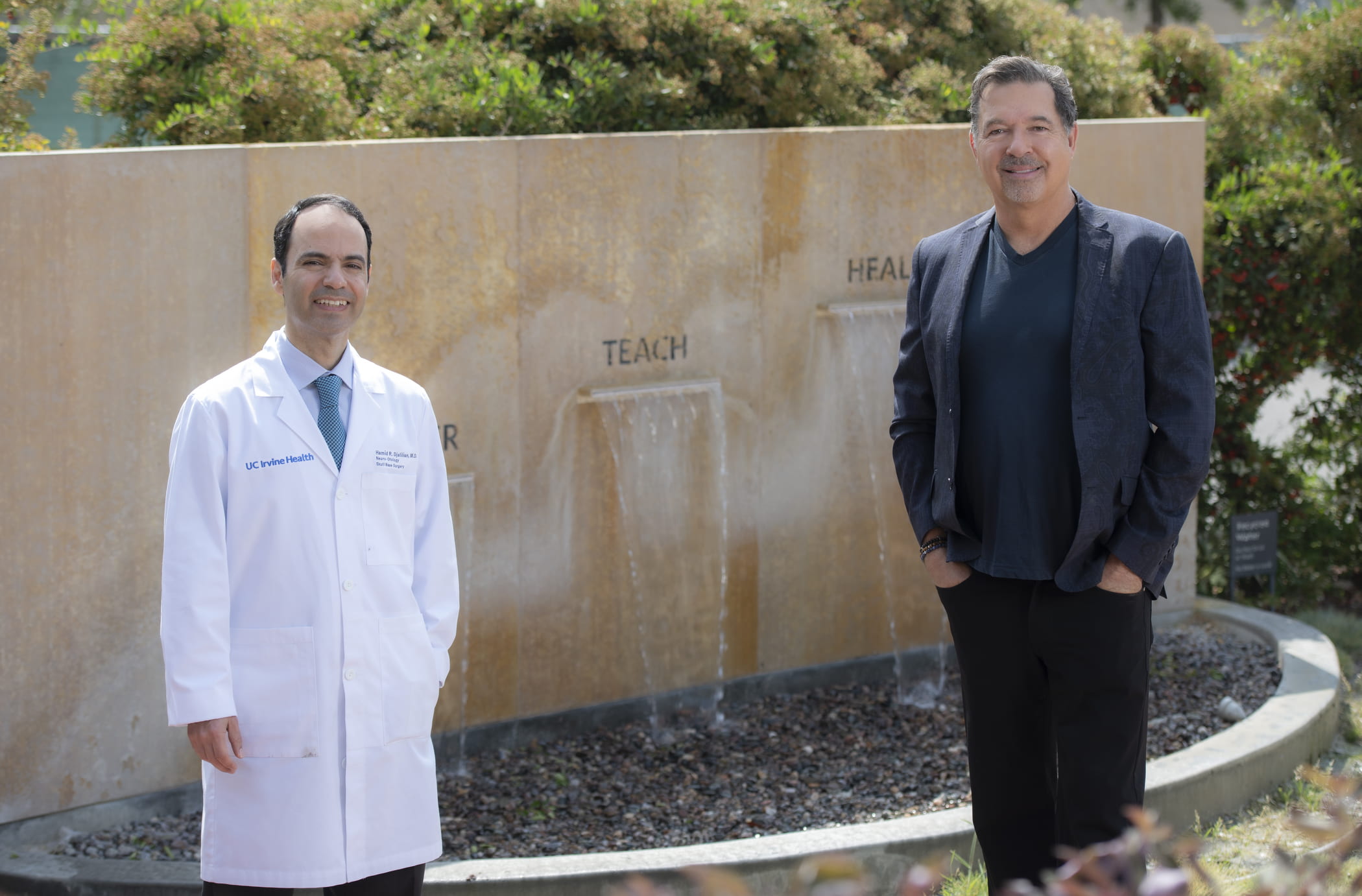
Embracing change to better lives
Brian T. Hervey talks about the transformative power of the Brilliant Future campaign
Brian T. Hervey has never met a challenge he didn’t want to tackle. Whether it’s scaling the steep slopes of a hiking trail or finding ways to fund research on premature birth, which affected his son, he’s all in.
At the moment, UCI’s Brilliant Future campaign consumes his energies. As vice chancellor for university advancement and alumni relations and president of the UCI Foundation, he oversees a staff of more than 200 charged with raising $2 billion and engaging 75,000 alumni to support teaching, research, student scholarships and infrastructure, among other essential university functions.
Hervey, 52, arrived at UCI in May 2015 as associate vice chancellor for health advancement and had been in the job just over five months when he accepted the responsibilities of interim vice chancellor. He was named to the position permanently in August 2016, chosen from a deep pool of highly qualified candidates, and tasked with heading the Brilliant Future campaign.
The fundraising effort, which publicly kicked off in October 2019, reached the $1 billion halfway mark in just 18 months. Donations support four campus priorities: advancing the American dream for students, transforming healthcare and wellness, accelerating world-changing research, and exploring the human experience.
Hervey sat down recently with UCI Magazine contributor Cathy Lawhon to talk about the transformative power of both the campaign and the campus and how embracing change has played a key role in his life.
How did you first come to UCI?
I had been vice president for development and communications at Scott & White Health. While in that role, I helped orchestrate a merger with a much larger hospital system, Baylor Health, which created a healthcare system with over 43 hospitals in central Texas. At an Association of American Medical Colleges meeting, I let it be known I was looking for a new challenge. And within days a recruiter from UCI called.
What surprised or impressed you about UCI when you got here?
Very early on, I knew there was something special about the location and the campus culture being a place of big change around healthcare. There were plans in the works for a new medical complex. I felt it was the kind of exciting energy I like to be part of.
Your career path has changed course over the years, hasn’t it?
It has. I earned my bachelor’s degree in political science from Texas A&M and then professional certification to become a financial advisor for a major investment firm. When my son, Brandon, was born, he spent several weeks in a neonatal intensive care unit. I became interested in raising money for the March of Dimes and eventually supervised all of the local chapter’s fundraising endeavors. It changed my focus. I’ve had opportunities to help build hospitals and start schools and help improve people’s lives, which has been very rewarding. By the way, Brandon recently graduated from the University of Texas at Dallas and is doing great.
A big part of the Brilliant Future campaign is “transforming healthcare and wellness.” Just months after the campaign launched, COVID-19 hit. What was the impact?
With almost every campaign, there’s some kind of economic event, and COVID was it for us. We were fortunate that UCI had researchers, basic scientists and clinical faculty doing groundbreaking work on COVID-19. And from a donor perspective, it provided an opportunity to be involved and make a difference.
What about increasing alumni involvement? That’s a campaign goal too, isn’t it?
Yes. In addition to raising money for current projects, a second goal is to engage community members and alumni, and they’re really stepping up. We’re finding ways to build new UCI Alumni Association chapters worldwide. We think the UCIAA has already innovated as to how it serves alumni and the university.
When you are out and about in your daily life, what is your elevator speech about UCI?
I believe the collaborative problem-solving that occurs at UCI distinguishes it from other universities. UCI fosters innovative collaborations among law, medicine, the arts, the social sciences, humanistic fields and STEM specialties to create truly breakthrough solutions. As a result, UCI’s reach and influence grow wider every day.
Where do you think UCI will be at the end of the campaign?
I believe we’ll surpass our $2 billion goal, thanks to our growing community of supporters. In terms of visibility, UCI Health will have a larger presence and more locations people can access with the new UCI Health – Irvine medical complex. From a university perspective, we should see a rise in rankings.
“I’ve had opportunities to help build hospitals and start schools and help improve people’s lives, which has been very rewarding.”
It doesn’t sound like you have much downtime. What do you do to relax?
As an Orange County resident, I love our proximity to the beach; I try to prioritize some time outside and hike in Crystal Cove State Park. I enjoy traveling; I just returned from an Alaska cruise. And I’m a big James Bond fan; I have a pretty impressive Bond memorabilia collection.
Dare I ask who was the best Bond?
Sean Connery. Most everybody says that, but it’s true. He defined the role that everybody else has to live up to.
Fundraising for a multidisciplinary campus – especially one with medical facilities attached – requires wide-ranging knowledge. What’s the best career advice you’ve ever received?
My uncle, Dick Hervey, who was my mentor and president of the Texas A&M Association of Former Students, told me: “Whatever you choose to do, be best and most knowledgeable. You have to differentiate yourself and be constantly learning.” For me, that means continuing to seek out mentors, staying up to speed as a leader in the field, teaching, and thinking about the next generation and how to make them successful.


